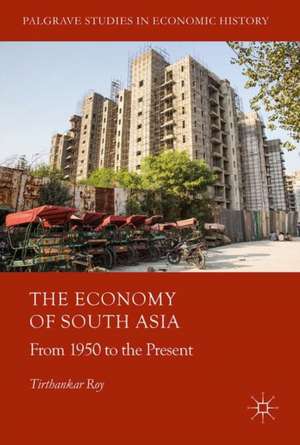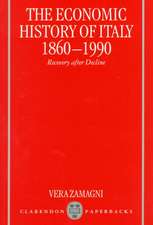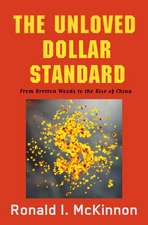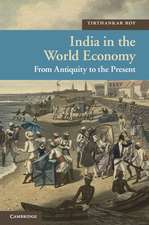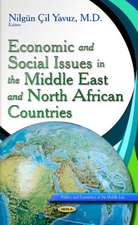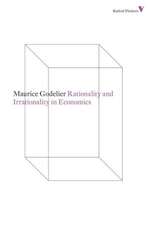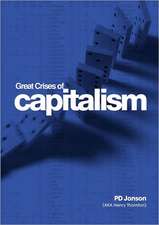The Economy of South Asia: From 1950 to the Present: Palgrave Studies in Economic History
Autor Tirthankar Royen Limba Engleză Hardback – 16 aug 2017
| Toate formatele și edițiile | Preț | Express |
|---|---|---|
| Paperback (1) | 530.50 lei 38-44 zile | |
| Springer International Publishing – 3 aug 2018 | 530.50 lei 38-44 zile | |
| Hardback (1) | 787.15 lei 6-8 săpt. | |
| Springer International Publishing – 16 aug 2017 | 787.15 lei 6-8 săpt. |
Din seria Palgrave Studies in Economic History
-
 Preț: 497.34 lei
Preț: 497.34 lei -
 Preț: 358.22 lei
Preț: 358.22 lei - 15%
 Preț: 580.36 lei
Preț: 580.36 lei - 20%
 Preț: 939.29 lei
Preț: 939.29 lei -
 Preț: 292.28 lei
Preț: 292.28 lei - 17%
 Preț: 361.80 lei
Preț: 361.80 lei -
 Preț: 357.89 lei
Preț: 357.89 lei - 20%
 Preț: 690.48 lei
Preț: 690.48 lei - 17%
 Preț: 361.39 lei
Preț: 361.39 lei - 18%
 Preț: 945.79 lei
Preț: 945.79 lei - 18%
 Preț: 1012.53 lei
Preț: 1012.53 lei - 15%
 Preț: 700.29 lei
Preț: 700.29 lei - 18%
 Preț: 782.42 lei
Preț: 782.42 lei -
 Preț: 232.82 lei
Preț: 232.82 lei - 15%
 Preț: 644.82 lei
Preț: 644.82 lei -
 Preț: 384.31 lei
Preț: 384.31 lei - 15%
 Preț: 587.85 lei
Preț: 587.85 lei - 18%
 Preț: 899.21 lei
Preț: 899.21 lei - 18%
 Preț: 786.66 lei
Preț: 786.66 lei -
 Preț: 397.97 lei
Preț: 397.97 lei -
 Preț: 388.90 lei
Preț: 388.90 lei - 18%
 Preț: 737.57 lei
Preț: 737.57 lei -
 Preț: 387.20 lei
Preț: 387.20 lei - 15%
 Preț: 647.73 lei
Preț: 647.73 lei - 15%
 Preț: 646.62 lei
Preț: 646.62 lei -
 Preț: 419.06 lei
Preț: 419.06 lei - 15%
 Preț: 459.06 lei
Preț: 459.06 lei - 15%
 Preț: 712.22 lei
Preț: 712.22 lei - 18%
 Preț: 787.47 lei
Preț: 787.47 lei - 18%
 Preț: 1128.57 lei
Preț: 1128.57 lei - 18%
 Preț: 949.55 lei
Preț: 949.55 lei - 15%
 Preț: 471.53 lei
Preț: 471.53 lei - 15%
 Preț: 640.88 lei
Preț: 640.88 lei - 18%
 Preț: 898.26 lei
Preț: 898.26 lei - 18%
 Preț: 1394.21 lei
Preț: 1394.21 lei -
 Preț: 422.90 lei
Preț: 422.90 lei - 18%
 Preț: 955.40 lei
Preț: 955.40 lei - 18%
 Preț: 730.47 lei
Preț: 730.47 lei - 15%
 Preț: 711.56 lei
Preț: 711.56 lei - 18%
 Preț: 783.98 lei
Preț: 783.98 lei - 18%
 Preț: 900.01 lei
Preț: 900.01 lei - 18%
 Preț: 896.08 lei
Preț: 896.08 lei - 15%
 Preț: 705.83 lei
Preț: 705.83 lei - 15%
 Preț: 704.69 lei
Preț: 704.69 lei - 18%
 Preț: 1112.48 lei
Preț: 1112.48 lei
Preț: 787.15 lei
Preț vechi: 959.94 lei
-18% Nou
Puncte Express: 1181
Preț estimativ în valută:
150.64€ • 163.57$ • 126.54£
150.64€ • 163.57$ • 126.54£
Carte tipărită la comandă
Livrare economică 23 aprilie-07 mai
Preluare comenzi: 021 569.72.76
Specificații
ISBN-13: 9783319547190
ISBN-10: 3319547194
Pagini: 351
Ilustrații: XV, 351 p. 42 illus.
Dimensiuni: 148 x 210 mm
Greutate: 0.59 kg
Ediția:1st ed. 2017
Editura: Springer International Publishing
Colecția Palgrave Macmillan
Seria Palgrave Studies in Economic History
Locul publicării:Cham, Switzerland
ISBN-10: 3319547194
Pagini: 351
Ilustrații: XV, 351 p. 42 illus.
Dimensiuni: 148 x 210 mm
Greutate: 0.59 kg
Ediția:1st ed. 2017
Editura: Springer International Publishing
Colecția Palgrave Macmillan
Seria Palgrave Studies in Economic History
Locul publicării:Cham, Switzerland
Cuprins
Chapter 1. Introduction.- Chapter 2. Defining the Region: Geography and History.- Chapter 3. The State and the Economy I: India, Pakistan and Bangladesh.- Chapter 4. The State and the Economy II: Sri Lanka and Nepal.- Chapter 5. Growth and Development.- Chapter 6. Land Reform.- Chapter 7. The Green Revolution.- Chapter 8. Trade and Industry I: India.- Chapter 9. Trade and Industry II: Pakistan, Bangladesh, Sri Lanka and Nepal.- Chapter 10. Business.- Chapter 11. Migration.- Chapter 12. Summary and Conclusion.
Notă biografică
Tirthankar Roy is Professor of Economic History at the London School of Economics and Political Science, UK. His research interests include global history, the economic history of South Asia and industrialisation. A leading member of his field, Roy is the author of Law and the Economy in Colonial India (with Anand Swamy) and India in the World Economy from Antiquity to the Present.
Textul de pe ultima copertă
This book explores the historical roots of rapid economic growth in South Asia, with reference to politics, markets, resources, and the world economy. Roy posits that, after an initial slow period of growth between 1950 and the 1980s, the region has been growing rapidly and fast catching up with the world on average levels of living. Why did this turnaround happen? Does it matter? Is it sustainable? The author answers these questions by drawing connections, comparisons, and parallels between the five large countries in the region: India, Pakistan, Bangladesh, Sri Lanka and Nepal. It shows why, despite differences in political experience between these countries, similarities in resources and markets could produce similar trajectories. Home to a fifth of the world’s population, South Asia’s transformation has the power to change the world. Most accounts of the process focus on individual nations, but by breaking out of that mould, Roy takes on the region as a whole, and delivers a radical new interpretation of why the economy of South Asia is changing so fast.
Caracteristici
Offers the first economic history account of South Asian transition in the last 70 years Surveys the broad patterns of economic change in the five larger nations of South Asia (India, Pakistan, Bangladesh, Sri Lanka, and Nepal) in the years after the end of British colonial rule Explores the phenomenon of 'transition' from a socialistic development regime towards a market-driven and outward-looking one Provides new interpretations on ongoing economic changes Questions the long-term trajectory of economic growth in South Asia
